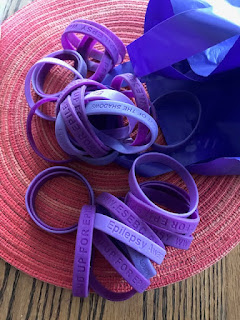Written by a parent for parents of children with epilepsy, Nonverbal Learning Disorder, Autism Spectrum Disorders, learning disabilities and other special and additional needs.
Wednesday, 30 November 2022
Special 2
Sunday, 6 November 2022
Marriage
Monday, 3 October 2022
First
The child born after a special needs child, the sibling of an intellectually or physically disabled child sometimes feels that they come second. I know that our younger daughter has felt at times like she is less loved, less attended to and at times more burdened with her sister's disability than she should be. An informative piece published some years ago in The Washington Post detailed this phenomenon in an article entitled "Eight things siblings of children with special needs struggle with". The author, Jamie Davis Smith, a parent of three typically developing children and one daughter with significant disabilities had this to say:
“Of all the things my children experience that I never did, their experience of growing up with a sister with significant disabilities is something I struggle to understand, even as I watch it unfold daily.”
Here are the eight things:
#1. Feeling like they need to be perfect. I know that our younger daughter has set impossibly high standards for herself. Throughout elementary and high school she strived for the highest marks and was devastated if they weren't forthcoming, which of course led to stress and anxiety.
#2. Feeling like they can't express their feelings. Our younger daughter has felt embarrassed by her sister and has felt angry with her at times but also unable to express these feelings openly.
#3. Having a different idea of family and home. There have been times when our younger daughter did not feel comfortable describing our family or the challenges it faced to others.
#4. Feeling as though their problems are minimized. When a sister is facing possible serious life-threatening seizures every day, our younger daughter's typical issues felt small and insignificant and therefore not worth sharing.
#5. Feeling isolated. Our daughter felt alone in her situation, felt overwhelmed with her feelings and was unsure about bringing friends home.
#6. Dealing with intolerance early and often. I know that our younger daughter has heard others disparage her older sister by calling her a retard or a spaz. This brought up a deluge of different emotions, many of them conflicting.
#7. Feeling like they are asked to help too much. Most seizures that our older daughter had were witnessed by us and therefore our younger daughter was called upon to help with timing the seizure, finding rescue meds or getting help. She admits now to this being traumatic at times.
#8. Feeling like they must grow up too quickly. Our daughter often felt like she needed to keep an eye on her sister even though her sister is 4 years older. This made her feel like the older, more responsible sibling.
It is not easy growing up these days, even less so when you are the younger or even the older sibling of a child with an intellectual or a physical disability. As parents all we can do is the best that we can and offer and ask for support whenever it is needed. Easier said than done I know, easier said than done.












